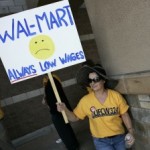Working conditions in Dollar General and Walmart compared to other industries
The Real State Of The Union For Workers

Below are just some of the wages and working conditions faced by tens of millions of workers in the U.S. — and how those conditions are determined in part by policy set in Washington.
Warehouse workers

Warehouse work is the hidden engine of the U.S. retail sector, but many of the so-called “lumpers” who load trucks bound for major retailers earn poverty wages on a contingent basis. The companies whose products are being moved prefer to outsource the warehouse responsibilities to third parties, which in turn outsource the work to other third parties. While it saves the companies plenty of money, the byzantine contracting arrangements tend to blur the lines of corporate accountability, leading to widespread allegations of wage theft and other abuses by temp firms at the bottom of the contract chain. As one expert put it to The Huffington Post, “All of these companies, wherever they possibly can, they want to create a workforce that doesn’t work for them.”
Dollar store employees

Dollar stores — Dollar General, Dollar Tree and Family Dollar — are one of the fastest-growing sectors of the retail economy. By one measure, a new dollar store is opening every six hours in the United States. But much of that growth, as HuffPost reported, isunderwritten by dubious labor practices by the big chains that collectively employ over 100,000 people. Even though managers spend their days doing grunt work — like unloading trucks and stockings shelves — their designation as “managers” excludes them from basic protections in federal labor law, like a guaranteed minimum wage and time-and-a-half for overtime. Some of them work so hard physically that they get hurt, but at the end of the day, they don’t earn much more than the workers they oversee. Managers throughout the country are now suing the chains over these practices.
Meatpackers

Working on a poultry processing line is a dangerous and low-paying job, full of repetitive motion and muscle pain. A recent government study found that four in ten workers at one chicken plant in South Carolina showed signs of carpal tunnel syndrome, the painful hand-and-wrist condition. Despite such findings, federal regulators are now considering a proposal to raise the maximum line speed even higher — a move that has the wide backing of the poultry industry. One poultry worker told HuffPost that the men and women who eviscerate and debone chicken carcasses can barely keep up at current speeds. Faster line speeds, he said, were nearly unimaginable: “It’s a job where you don’t get any relief.”
Repo agents

While auto repossession has always been difficult and dangerous work, big banks have recently found new ways to make it low-paying as well. The lenders who underwrite auto loans have recently pushed auto repossession agents into working on a “contingency” basis — meaning if they don’t find the car, they don’t get paid a dime. Not only has that squeezed agents’ wages, it’s also encouraged them to put their lives and others’ in danger by making risky repossessions. HuffPost reported the story of one agent working on contingency who ran over a car owner during an altercation. As the owner of one repo outfit said, the lenders’ stinginess is “turning good people into bad, making them do things they wouldn’t normally do.”
Fast-food workers

The quintessential image of a fast-food worker is a high school kid looking for spare cash at night and on the weekends. In reality, many fast-food workers are now grownups with families to support; 40 percent are now 25 years or older, according to the National Employment Law Project. But despite the growing age and experience of its workforce, the fast-food industry is about as low-paying as its ever been when adjusted for inflation, with a median wage under $9. HuffPost has interviewed fast-food workers whose most recent raises were granted not by their employers but by the U.S. Congress, when the federal minimum wage was last hiked in 2009. For minimum wage workers in states that don’t adjust the wage floor each year for inflation — and that would be the majority of states, including pricy New York — the wait between raises can be years.
Taxi and sedan drivers

A lot of sedan and taxi drivers aren’t technically employed by the companies they work for. Like other folks in the transport industry, they’re instead classified as “independent contractors” working on their own. Many of them aren’t independent in any real sense. The companies set the terms of employment — where the drivers work, when they must be available, and even what they wear while on the job. But the companies reap major benefits by classifying the workers as independent — like not having to pay workers’ comp or unemployment taxes, and not having to worry abouttheir drivers unionizing. Since they’re technically not employees, the drivers can’t expect health coverage or other basic workplace benefits. In some cases, they don’t even get to keep the “gratuities” that the companies charge their clients.
Walmart workers

Earlier this month, officials at the National Labor Relations Board formally accusedthe world’s largest private-sector employer of retaliating against workers who spoke out about working conditions. The general counsel for the board charged Walmart with violating the rights of more than 60 workers in 14 states surrounding the Black Friday strikes that became national news for the retailer.
Coal miners who take a stand

Coal mining remains one of the most dangerous jobs in the world. Even though U.S. miners have strong whistleblower protections written into federal law, those who speak out about mine hazards or refuse to do risky work still have a way of getting demoted or fired. The official investigations into the Upper Big Branch mining disaster, which killed 29 people, showed that miners who dared question the dubious orders coming from management were threatened with their jobs. Such coercion can be routine in some mines. Charles Scott Howard, a Kentucky miner, has been reinstated on the job at least three times after being retaliated against for his whistleblowing on safety issues. Reuben Shemwell, another Kentucky miner, was hit with a lawsuit by his own company merely for filing a whistleblower complaint with the feds.
Restaurant workers who try to unionize

With few exceptions, the restaurant industry is a union-free world. Chains and franchisees can usually rely on the work’s high turnover rate to keep unions naturally at bay, but in recent cases, owners have taken a much more proactive approach. A Jimmy John’s sandwich shop franchisee in Minnesota fired pro-union workers during a heated unionization battle. Similarly, a major Panera franchisee in Michigan hasdeclined to accept the successful union election of its bakers. The federal labor board has issued a raft of union-busting charges against the company, but the bakers still don’t have a contract. “I came into this thinking we had the right to bargain collectively,” one baker told HuffPost.
Housekeepers

At a lot of U.S. hotels, the men and women who clean guests’ rooms are no longer even employed by the hotels. Instead, they work for temp staffing agencies on a day-to-day basis. This arrangement has obvious benefits for large hotel chains; by outsourcing the work, they don’t have to worry about offering a living wage, health care coverage or other benefits to the housekeepers who clean their hotels. But for workers, the outsourcing comes at a steep cost. Previously in-house workers can be rehired through the temp firms at substantially lower wages, and many of them enjoy no job stability whatsoever as temporary employees. “It’s everywhere now,” an Indianapolis janitor said of the hotel outsourcing. “The housekeepers, the restaurant, the stewards, laundry, room service …”
More From I Hate Working in Retail
Share the joy

























Recent Comments